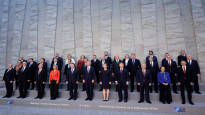France, Germany, Holland, Denmark, Bulgaria, Montenegro and Albania.
These countries will probably get their defense spending increased to NATO’s two percent goal this year, estimates a leading researcher Matt Pesu From the Foreign Policy Institute.
Secretary General of NATO Jens Stoltenberg said on Wednesday that 18 NATO member countries will reach the goal during the current year. At this moment, only 11 NATO countries reach it.
– Among those who will reach the goal this year are countries like Germany, France, Holland and Denmark. In addition, there is a country from the eastern parts of the alliance, states Pesu, who specializes in security policy and NATO.
NATO has not announced which countries have reached the goal. The countries listed above have said they are committed to achieving the two percent goal or are close to it.
After Russia’s attack on Ukraine, many NATO countries said they would increase their defense spending towards the goal.
– Especially Germany and France have been under the magnifying glass. Also in Holland and Denmark, it is outlined in the safety documents that they will rise to two percent.
Pesu states that raising the defense budgets of the big countries, i.e. Germany and France, is of great importance for the defense of NATO and Europe as a whole.
– Big countries’ spending really matters. For smaller countries, it is a way to show that they are not free passengers.
Also in the United States, the Republican presidential candidate is likely to rise Donald Trump’s tough talks have increased the pressure. Trump said over the weekend that the United States would not defend countries that do not spend enough money on their defense.
– The pressure is intense. The reason why NATO now apparently came out with the figures is at least partly related to Trump’s possible rise to power again and the comments he has made recently, Pesu states.
It is also possible to flirt
According to Pesu, defense spending of two percent has become a symbolic and political yardstick in NATO. He states that there is a reason to look at how the countries arrive at the account. It is also possible to flirt.
– Since there is political pressure to reach this level, states are creative in how they get there. Higher spending levels on paper do not always inevitably materialize as military capability.
There are different ways to pull.
– The numbers have been embellished with creative calculations. The most important thing is to see how much of the funds go to investments and training activities. If, for example, pension or bureaucracy expenses are included, then of course they do not automatically produce military capability.
Pesu states that NATO countries’ defense spending has increased after the Russian attack due to investments. There are many years behind us when there were fewer investments.
– The most important thing would be that the spending levels remain in the long term. If the states commit to it, it will also begin to materialize as a military capability.
– We should not yet jump to the conclusion that there has now been a huge turnaround in NATO.
What matters is how the Russian threat is assessed in the future. Pesu believes that Russia’s neighboring countries will keep their defense spending high in the long term. It’s a different matter how the NATO countries further away from Russia operate.
– Do they want to keep spending high in the long term? That is the key question here.
Yesterday, Stoltenberg said at the NATO defense ministers’ meeting that the US criticism of countries’ reluctance to spend money on defense is no longer valid. According to Pesu, this was partly to embellish things.
– However, it is undeniable that in Europe more money is spent on defense than before. However, it only matters how long-term the commitment is.
After this year, 13 NATO countries will still have less than two percent of their defense spending. Is it possible that most of the remaining countries would ever reach that goal?
– It is unlikely that everyone will reach it. The under-budgeting of certain countries can be frowned upon, if they produce even some talent for the federation’s use, says Pesu.
